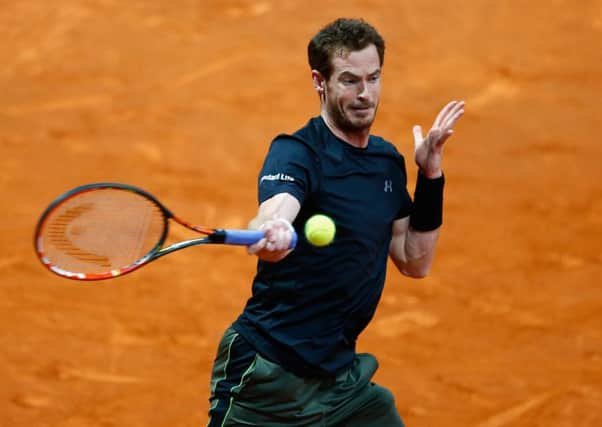Andy Murray scores second victory inside 24 hours


He marched into the quarter-finals of the Masters 1000 event, dismissing Marcel Granollers 6-2, 6-0, his second win in a 24-hour spell and one that looked all the more impressive given the way the tournament had treated him on Wednesday night.
For the second time in a week, Murray found himself playing more than once in a day. Last Saturday, he played his rain-delayed quarter-final and then his semi-final in Munich before rounding off his day with a doubles semi-final. But at least those matches were played in daylight – asking him and Philipp Kohlschreiber to play on until 2.59am yesterday morning simply because the tournament organisers could not arrange a workable schedule to save themselves was ridiculous.
Advertisement
Hide AdAdvertisement
Hide AdJust 18 hours after he had beaten the German, Murray was back at work trying to find a way past Granollers last night. He left the stadium complex at 3.15am – with a face like thunder – and was not in bed until 4.30am. Now he was trying to reach a quarter-final on just a few hours of sleep and whatever preparation he could squeeze into the limited time available to him.
The only saving grace was that Granollers was feeling the strain, too. He took three hours and 20 minutes to beat Gael Monfils on Wednesday and, by the end of it, he was cramping and exhausted and could barely hobble off the court. But at least he was finished before midnight and in bed long before Murray was finished with Kohlschreiber.
For Murray, yesterday must have seemed like Groundhog Day. For the second day running, he had been kept waiting in the locker room as Svetlana Kuznetsova occupied the court and took the scenic route into the next round. Yesterday it took her more than three hours to reach the semi-finals (with Murray waiting in the wings); on Wednesday, she had taken two and three quarter hours to win – two and three quarter hours that pushed the start time for Murray’s match on and into Thursday morning, 1.11am to be precise. That was the second-latest start time on record for an ATP Tour match (Rafael Nadal began his quarter-final in Rio de Janeiro at 1.13am back in February) and a moment that Murray would rather forget.
The Scot took the short turnaround between his matches in his stride, but following last night’s win he had a word of advice for competition organisers.
“These are the ATP’s biggest tournaments. We’re told all of the time to speak well of the tournaments,” he said. “If they want to see the top players playing the best tennis, don’t have them play matches at 3 o’clock in the morning.”
Chris Kermode, the chief executive of the ATP, issued a statement acknowledging that the situation was unsatisfactory – to put it mildly – but as is the way with the ATP, they are only “looking” at the problem when, in fact, they need to act swiftly. The schedules need to be more flexible, leaving room for the possibility that some matches may go the distance. A simple rule banning tournaments from starting matches after midnight would help.
“There are a number of challenges inherent with match scheduling at tennis events, with multiple interests at stake across players, promoters, ticket holders, TV broadcasters and media,” Kermode said.
“The scheduling issues in Madrid were unfortunate, with players going on-court past 1am at a disadvantage for the following day’s matches.
Advertisement
Hide AdAdvertisement
Hide Ad“It is critical that the interests of both players and tournaments are protected in a balanced manner on the Tour moving forward. While such instances are rare, we will look at reducing the risk of similar instances occurring in the future.”
None of that helped much last night against Granollers, however. Murray had only lost to Granollers once before and that was when his back was so painful that he was forced to pull out of their second-round match in Rome in 2013. A couple of weeks later, Murray pulled out of the French Open and by the end of the summer, he was having surgery to cure the back problem. Yesterday, though, Murray may have been tired but he had a plan and he had a glint in his eye. He kept his serve in good order, he was aggressive from the baseline and he took his chances when they presented themselves. Granollers was never sure where the ball was going next – and even if he guessed correctly, he could rarely get there in time to do anything about it. Murray faced just one break point – and that in the penultimate game of the match – but he snatched it back before Granollers could do anything with it.
Just 18 hours before, Murray had been distracted and tetchy – understandably so given the circumstances – but last night he was controlled, aggressive and, ultimately, successful. And, best of all, he got home in time to get a decent night’s sleep.